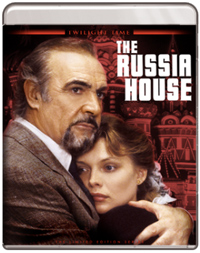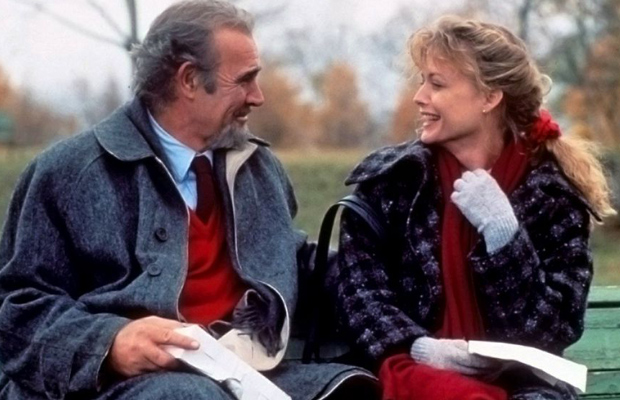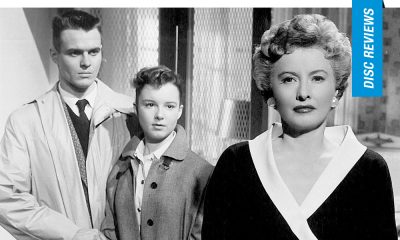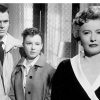Disc Reviews
The Russia House | Blu-ray Review
 Espionage thrillers remain a lucrative cinematic staple, as evidenced by continued adaptations of Robert Ludlum, Tom Clancy, and the enduring legacy of the iconic British Secret Service agent invented by Ian Fleming. Another revered espionage author whose novels continue to inspire auteur cinema is John Le Carre, experiencing something of a resurgence over the past decade with The Constant Gardner (2005), Tinker Tailor Soldier Spy (2011), A Most Wanted Man (2014), and just this year, a mini-series version of “The Night Manager,” and Our Kind of Traitor. Le Carre’s works weren’t always so prolifically adapted, and during the 1990s, the only major cinematic feature of his was Fred Schepisi’s The Russia House (1990), rather methodically transcribed into a screenplay by none other than playwright Tom Stoppard (hired when Mike Nichols was initially tapped to direct). Competing at the 1991 Berlin International Film Festival (where it lost to Marco Ferreri’s The House of Smiles), the film garnered Michelle Pfeiffer a Golden Globe nomination, but the Cold War thriller was treated to a rather chilly reception considering a highly notable supporting cast. Sean Connery stars as a British publisher who receives an unsolicited Russian manuscript containing damning evidence about their nuclear program, and he is jostled between American and British agencies demanding his involvement in substantiating the truth of the document.
Espionage thrillers remain a lucrative cinematic staple, as evidenced by continued adaptations of Robert Ludlum, Tom Clancy, and the enduring legacy of the iconic British Secret Service agent invented by Ian Fleming. Another revered espionage author whose novels continue to inspire auteur cinema is John Le Carre, experiencing something of a resurgence over the past decade with The Constant Gardner (2005), Tinker Tailor Soldier Spy (2011), A Most Wanted Man (2014), and just this year, a mini-series version of “The Night Manager,” and Our Kind of Traitor. Le Carre’s works weren’t always so prolifically adapted, and during the 1990s, the only major cinematic feature of his was Fred Schepisi’s The Russia House (1990), rather methodically transcribed into a screenplay by none other than playwright Tom Stoppard (hired when Mike Nichols was initially tapped to direct). Competing at the 1991 Berlin International Film Festival (where it lost to Marco Ferreri’s The House of Smiles), the film garnered Michelle Pfeiffer a Golden Globe nomination, but the Cold War thriller was treated to a rather chilly reception considering a highly notable supporting cast. Sean Connery stars as a British publisher who receives an unsolicited Russian manuscript containing damning evidence about their nuclear program, and he is jostled between American and British agencies demanding his involvement in substantiating the truth of the document.
As Russia experiences a significant cultural restructuring, a secret manuscript mysteriously appears, having been penned by USSR scientist Dante (Klaus Maria Brandauer) and funneled to boozy British publisher Barley Blair (Sean Connery) through beautiful confidante Katya Orlova (Michelle Pfeiffer). Bemused by the sudden attention thrust upon himself and strong-armed into assisting both American and British intelligence officials discover if the manuscript is indeed genuine (as it contains information about Russia’s nuclear capabilities (which could be potentially disastrous for the glasnost Russians). Reluctantly traveling to Moscow, Barley is instantly taken with Katya’s beauty and intelligence, and a quiet romance blossoms betwixt the political posturing.
Schepisi, coming off a lucrative period following 1987’s Roxanne, and his Oscar nominated return to Australia A Cry in the Dark (1988) starring Meryl Streep, reunites with regular DP Ian Baker for a ravishingly photographed cityscape of Moscow, which is clearly the film’s strong point. Significant for its distinction as the first Western production approved to film substantially in the Soviet Union (Walter Hill’s Red Heat was given permission to shoot a sequence in Moscow), the fall of the Berlin Wall also took place while it was in production.
Undoubtedly on the more intelligent but at times overly complicated end of espionage thrillers, The Russia House suffers from similar shortcomings evidenced in Tom Stoppard’s directorial debut Rosencrantz and Guildenstern Are Dead (1990), wherein large swaths of interminable dialogue (especially amongst several revolving supporting characters here) sometimes feels like dead weight around the neck of the narrative, which includes a romance between a likeable alcoholic jazz musician played by Sean Connery and a staunchly reserved Pfeiffer, who commands the accent but isn’t otherwise very lively. Auteur Ken Russell provides some brief entertainment as a British operative, but a slew of others, including James Fox, Roy Scheider, and Klaus Maria Brandauer hardly register. J.T. Walsh gets a few bitchy jabs (pointedly inquiring about Connery’s youthful homosexual experiences provides a brief burst of energy), but nothing seems to really energize a plot which flops around like a dead fish.
Disc Review:
Twilight Time releases their transfer in a limited edition of 3,000 units in 2.35:1. Baker’s rendering of Moscow and Leningrad, where Connery and Pfeiffer are usually framed by significant architecture, is where the film’s visual splendors are found (while too much of the film takes place in sterile office spaces). Audio is equally administered in the 2.0 DTS-HD, with Jerry Goldsmith’s layered score (perhaps best exemplified with a burst of jazz underneath sinister stirrings as Connery and Pfeiffer work around wire taps through note writing) evident throughout.
Building The Russian House:
This eight minute segment features cast and crew behind-the-scenes, with Schepisi and Pfeiffer addressing her curious casting as a Russian.
Final Thoughts:
Compelling more so for capturing elements of a certain time and place rather than as a significant treatment of espionage or romantic intrigue, The Russia House fails to stir any real emotional development or excitement.
Film Review: ★★/☆☆☆☆☆
Disc Review: ★★★½/☆☆☆☆☆































